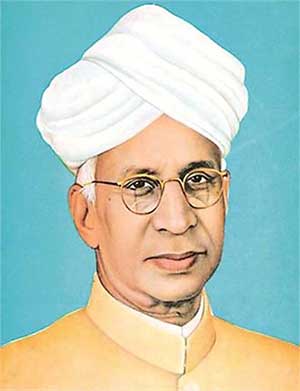Death Anniversary Special : Bharat Ratna Sarvepalli Radhakrishnan
The great noted philosopher and theologian Sarvepalli Radhakrishnan was born in Tiruttani, India, in 1888, into a Telugu Brahmin family. At the age of 17, he began to study at the prestigious Madras Christian College from which he graduated in 1906 with a Master in philosophy. His thesis was entitled “The Ethics of the Vedanta and its Metaphysical Presuppositions.” He went on to gain a PhD in philosophy.
In 1919 Radhakrishnan was accepted at the department of philosophy at the Mardras Presidency College. The following year, he became professor of philosophy at the University of Mysore. At this point he was already a well-known philosopher in India and had published his book on The Philosophy of Rabindranath Tagore (1918), in which he defended the idea that the poet expressed the true spirit of Indian philosophy.
Facts on his brilliant acedemic intellectual journey :
- In 1921 he was offered the George V chair of moral sciences at the University of Calcutta.
- In 1929 he was invited to Oxford to deliver the Hibbert Lectures, which resulted in the publication of An Idealist view of Life (1932).
- He then taught at Harris Manchester College at Oxford where he specialised in comparative religion.
- He was knighted in 1931 by King George V, and became Vice-Chancellor of the University of Andhra that same year, a position which he held until 1936. Between 1933 and 1935 he was proposed for the Nobel Prize in Literature.
- In 1936, Radhakrishnan was appointed professor of oriental religions and ethics at the University of Oxford and became a fellow of All Souls College.
- In 1939 he took over responsibilities as Vice-Chancellor at Banaras Hindu University, where he remained until 1948.
Important role in the diplomatic and intellectual international life :
- In 1926, he represented the University of Calcutta at the Congress of British Universities, and in September 1926, at the World Congress of Philosophy at Harvard.
- In 1931, Lord Irwin, Governor-General of India, appointed Radharkrishnan in 1931 to succeed Jagadish Chandra Bose at the ICIC, and Radharkrishnan stayed until 1938. He was particularly interested in questions of education and international cooperation among universities.
- He played an important role in the establishment of the Indian Committee of Intellectual Cooperation between 1935–1936, which was established by the Inter-University Board, the headquarters of which were at the University of Mysore.
- After the Second World War Radharkrishnan involved himself with UNESCO where he represented India from 1946 until 1952. Between 1949 and 1952, he was Indian ambassador in the USSR. During that time, he published an article with the UNESCO journal entitled “The Bonds Uniting India and UNESCO” (1951). He received honorary membership of the British Royal Order of Merit in 1963.
- He participated at the constituent assembly of India and was elected Vice-President of India in 1952. Between 1962 and 1967 he served as the second President of India. He died in 1975.
He was a proponent of Advaita Vedanta and masterfully defended the 'sanatan dharma' of Hinduism against "uninformed Western criticism". He has been an instrumental figure in the reshaping of the Hindu identity in the twentieth century, with his tremendous knowledge, his power to change the country for the better, and his deeper and benevolent understanding of multiple cultures and religions.
Books written by Sarvepalli radhakrishan :
Radhakrishnan’s written works include :
- Indian Philosophy, 2 vol. (1923–27),
- The Philosophy of the Upanishads (1924),
- An Idealist View of Life (1932),
- Eastern Religions and Western Thought (1939),
- East and West: Some Reflections (1955). In his lectures and books he tried to interpret Indian thought for Westerners.
- The Hindu View of Life
- A Source Book in Indian Philosophy
- The Pursuit of Truth
- Religion, Science and Culture
- The Heart of Hindusthan
- Living with a Purpose
- Faith Renewed








